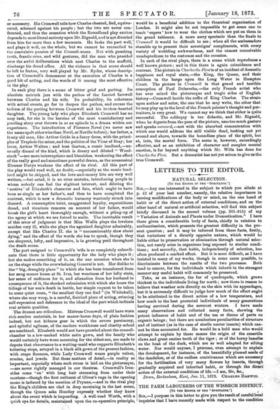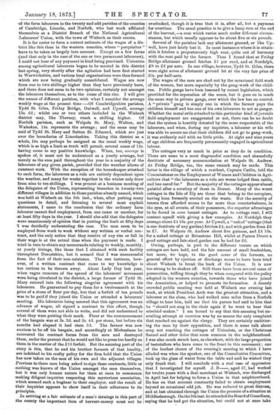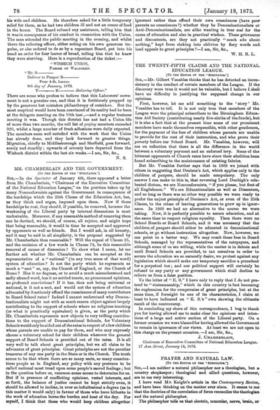THE FARM LABOURERS OF THE VVISBECH DISTRICT. [TO THE EDITOR
OF THE " SPECTATOR:1 Sin,—I purpose in this letter to give you the result of carefullotal inquiries that I have recently made with respect to the condition
-of the farm labourers in the twenty and odd parishes of the counties of Cambridge, Lincoln, and Norfolk, who last week affiliated themselves as a District Branch of the National Agricultural Labourers' Union, with the town of Wisbech as their centre.
It is far easier to form a correct estimate of the wages of a dis- trict like this than in the western counties, where " perquisites " have to be taken so largely into account. Except on a few farms (and that only in the case of the one or two permanent labourers), I could not hear of any payment in kind being practised. Unionism
among agricultural labourers began to be mooted in this district 'last spring, very shortly after the agitation had been first started in Warwickshire, and various local organisations were then formed which are now being gradually consolidated. Wages are now from one to two shillings higher than they have previously been, and there does not seem to be two opinions, certainly not amongst the labourers themselves, as to the cause of this rise. I will give the names of different parishes, with what I consider the average weekly wage at the present time :—Of Cambridgeshire parishes, Tydd St. Giles, Friday Bridge, Outwell, and Upwell, average 13s. 6d; whilst one or two others included in the Wisbech district may, like Thorney, reach a shilling higher. . Of Norfolk parishes, such as Walpole St. Mary, Walton, and Walsoken, 14s. represents the average ; and the same may be said of Tydd St. Mary and Sutton St. Edmund, which are just over the boundaries of Lincolnshire. Taking this district as a whole, 14s. may perhaps be assigned as the usual weekly wage, which is as high a limit as truth will permit, several cases of 12s. having come to my positive knowledge. When, too, average is spoken of, it must not be understood as a yearly average, but merely as the sum paid throughout the year to a majority of the labourers of any given parish, provided that the weather allows of constant work. With the exception of the housekeeper attached to each farm, the labourers as a rule are entirely dependent upon 'the weather, and many for weeks together in the winter only draw from nine to ten shillings. I was present at a business meeting of the delegates of the Union, representing branches in twenty-two different villages in addition to those parishes already named, which was held at Wisbech on the 9th inst., when, after putting many questions in detail, and listening to several most explicit statements, I came to the conclusion that the ordinary farm labourer cannot find employment, from one cause or another, for -at least fifty days in the year. I should also add that the delegates were unanimously of opinion that in putting the limit at fifty days I was decidedly understating the case. The men seem to be employed from week to week without any written or verbal con- tract, and the only notice that they receive of any rise or fall in their wage is at the actual time when the payment is made. I tried in vain to obtain any memoranda relating to weekly, monthly, or yearly hirings, like those that I obtained with such facility throughout Dorsetshire, but it seemed that I was unsuccessful from the fact of their non-existence. The one instance, how- ever, of a written contract that came to my knowledge is too curious to be thrown away. About Lady Day last year, when vague rumours of the spread of the labourers' movement were being circulated in the district, a large farmer of Tydd St. Mary entered into the following singular agreement with his
labourers. He guaranteed to pay them for a twelvemonth at the price of a stone of flour per day, but that a forfeit of ten pounds was to be paid if they joined the Union or attended a labourers' meeting. His labourers being assured that this agreement was an advance of wages, all signed a contract to this effect, though several of them were not able to write, and did not understand to what they were putting their mark. Flour at the commencement of the bargain was at 2s. 3d. and 28. 4d. per stone, but before six months had elapsed it had risen 3d. The farmer was now anxious to be off his bargain, and accordingly at Michaelmas he recovered the contract forme from the men and destroyed -them, under the pretext that he would not like to press too hardly on them in the matter of the £10 forfeit. But the amusing part of the ,story is this, that he and his brother farmers of that locality, are indebted to his crafty policy for the firm hold that the Union has now taken on the men of his own and the adjacent villages.
Previous to these men being asked to sign these contracts, little or .nothing was known of the Union amongst the men themselves, but it was only human nature for them at once to commence making diligent inquiries respecting this mysterious association, which seemed such a bugbear to their employer, and the result of their inquiries appears to show itself in their adherence to its principles.
In arriving at a fair estimate of a man's earnings in this part of the county the important item of harvest-money must not be overlooked, though it is true that it is, after all, but a payment for overtime. The usual practice is to give a lump sum at the end of the harvest, —a sum which varies much under different circum- stances, but which usually appears to be about five or six pounds.
Several of the parishes lack any allotment ground, or like Up- well, have just lately lost it. In most instances where it is attain- able it fetches a preposterously high rent, quite out of harmony with the rent paid by the farmer. Thus I found that at Friday Bridge allotment ground fetches £1 per rood, and at Nordelph,
£8 to £9 per acre. In one village, however, Tydd St. Giles, there were eight acres of allotment ground let at the very fair price of 30s. per half-acre.
The wages of the men are eked out by the occasional field work of the women, but more especially by the gang-work of the child- ren. Public gangs have been lessened by recent legislation, which provided for the separation of the sexes, but it goes on in much the same way in private gangs, over which the law has no control. A " private " gang is simply one in which the farmer pays the children himself and has one of his own labourers to act as ganger. Whether the moral evils attached to this particular kind of juvenile field employment are exaggerated or not, there can be no doubt that the system is heartily detested by the more respectable of the labourers, and when, during my inquiries, a labourer or his wife was able to assure me that their children did not go to gang-work, it was evidently said with no little pride. At eight and nine years of age children are frequently permanently engaged in agricultural labour.
The cottages vary as much in price as they do in condition. There are some in a most disgraceful condition and shamefully destitute of necessary accommodation at Walpole St. Andrew. At Friday Bridge, too, the same remark may be made. This latter is the village of which a resident, Captain Catlin, told the Commissioner on the Employment of Women and Children in Agri- culture that "the labourers as a rule are worse lodged than cattle, and less cared for." But the majority of the cottages appear almost palatial after a scrutiny of those in Dorset. Many of the worst cottages in the Isle of Ely are those that belong to the occupiers, having been formerly erected on the waste. But the security of tenure thus afforded seems to far more than counterbalance, in the eyes, at all events, of their possessors, the superior advantages to be found in some tenant cottages. As to cottage rent, I will content myself with giving a few examples. At Nordelph they average about £4 10s. per year. At Upwell, a " naked" cottage (that is one destitute of any garden) fetches 14, and with garden from £6 to £7. At Walpole St. Andrew about five guineas, and £4 10s. for a naked cottage at Brimstone Hill, whilst at Parson Drove a good cottage and fair-sized garden can be had for £6.
Owing, perhaps, in part to the different tenure on which cottages are here held, and the fair amount of small freeholders, but more, we hope, to the good sense of the farmers, no general effort by ejection or discharge seems to have been tried about Wisbech to break the back of the Union. it is now too strong to be shaken off. Still there have been several cases of persecution, trifling though they be when compared with the policy adopted in the western counties, towards those who have joined the Association, or helped to promote its formation. A densely crowded public meeting was held at Wisbech one evening last week, at which President Arch was the greatest attraction, and a labourer at the close, who had walked nine miles from a Norfolk village to hear him, told me that his parson had said to him that he "should not sing in the choir again if he went to hear that mischief-maker." I am bound to say that this amusing but un- availing attempt at coercion was by no means the only complaint that reached me against the clergy. They are certainly embitter- ing the men by their opposition, and there is some talk about soup not reaching the cottages of Unionists, or the Christmas flannel and other doles that seem common in the neighbourhood. I was also much struck here, as elsewhere, with the large proportion of teetotallers who have come to the front in this movement ; one of the loudest cheers of the evening's meeting to which I have alluded was when the speaker, one of the Consultative Committee, took up the glass of water from the table and said he wished they only drank that. I will conclude with a real case of oppression that I investigated for myself. J. B—, aged 47, had worked for twelve years with a deal merchant at Wisbech, was discharged in April last for helping to form a Union in that neighbourhood. He has on that account constantly failed to obtain employment beyond an occasional odd job. He was reduced to great distress, and at lest obtained through the Union the promise of a situation at Middlesborough. On the 9 th inst. he attended the Board of Guardians, allying that he had got the situation, but could not at once take his wife and children. He therefore asked for a little temporary relief for them, as he had two children ill and not an ounce of food in the house. The Board refused any assistance, telling him that it was in consequence of his conduct in connection with the Union. The man attended the public meeting in the evening, and whilst there the relieving officer, either acting on his own-generous im- pulse, or else ordered to do so by a repentant Board, put into his hand an order for four loaves of bread, telling him that he knew they were starving. Here is a reproduction of the ticket :—
" WISRECH UNION,
Palma OF Warsomes.
"Mr. S---- Deliver to Pauper P.-- Four 4-1b. loaves.
9th day of January, 1873.
E-- Relieving Officer."
There are some who profess to believe that this Labourers' move- ment is not a genuine one, and that it is fictitiously propped up by the generous but mistaken philanthropy of outsiders. But the most sceptical would have been convinced of its reality had he been at the delegate meeting on the 10th inst.,—and a regular business meeting it was. Though this district has not had a Union life of more than two months, the roll list of paying members exceeded 920, whilst a large number of fresh adhesions were daily expected. The members seem well satisfied with the work that the Union has already done, and they look forward to greater things. Migration, chiefly to Middlesborough and Sheffield, goes forward, surely and steadily ; upwards of seventy have departed from the Wisbech district within the last six weeks.-.I am, Sir, &c., N. S.




































 Previous page
Previous page